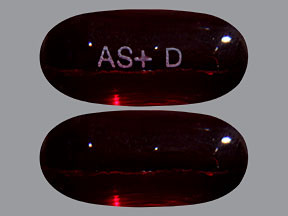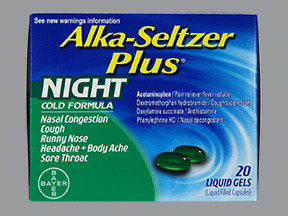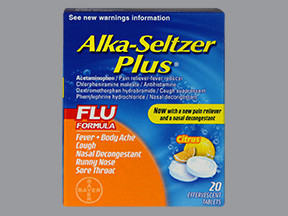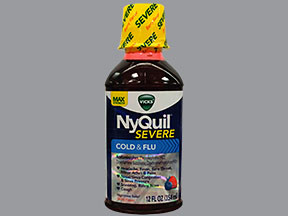DEXTROMETHORPHAN/DECONGESTANT/ACETAMINOPHEN/ANTIHISTAMINE - ORAL
PHONETIC PRONUNCIATION:
COMMON BRAND NAME(S): Vicks Nyquil
GENERIC NAME(S): dextromethorphan/pseudoephrine HCl/acetaminophen/doxylamine
Uses
USES: This combination medication is used to temporarily treat symptoms caused by the common cold, flu, allergies, or other breathing illnesses (such as sinusitis, bronchitis). Dextromethorphan is a cough suppressant that affects a certain part of the brain, reducing the urge to cough. Decongestants help relieve stuffy nose and ear congestion symptoms. Acetaminophen (APAP) is a non-aspirin pain reliever and fever reducer. Antihistamines help relieve watery eyes, itchy eyes/nose/throat, runny nose, and sneezing. This medication is not usually used for ongoing coughs from smoking, asthma, or other long-term breathing problems (such as emphysema), or for coughs with a lot of mucus, unless directed by your doctor. Cough-and-cold products have not been shown to be safe or effective in children younger than 6 years. Therefore, do not use this product to treat cold symptoms in children younger than 6 years unless specifically directed by the doctor. Some products (such as long-acting tablets/capsules) are not recommended for use in children younger than 12 years. Ask your doctor or pharmacist for more details about using your product safely. These products do not cure or shorten the length of the common cold and may cause serious side effects. To decrease the risk for serious side effects, carefully follow all dosage directions. Do not use this product to make a child sleepy. Do not give other cough-and-cold medication that might contain the same or similar ingredients (see also Drug Interactions section). Ask the doctor or pharmacist about other ways to relieve cough and cold symptoms (such as drinking enough fluids, using a humidifier or saline nose drops/spray).
How to use DEXTROMETHORPHAN/DECONGESTANT/ACETAMINOPHEN/ANTIHISTAMINE - ORAL
HOW TO USE: See also Warning section. If you are taking the over-the-counter product, read and follow all directions on the package label. If your doctor has prescribed this medication for you, take as directed by your doctor. If you have any questions, consult your doctor or pharmacist. Take this medication by mouth with or without food or as directed by your doctor. If stomach upset occurs, it may help to take this medication with food or milk. Drink plenty of fluids when you use this medication unless otherwise directed by your doctor. The fluid will help loosen the mucus in your lungs. If you are using the liquid form of this medication, carefully measure the dose using a special measuring device/spoon. Do not use a household spoon because you may not get the correct dose. If your liquid form is a suspension, shake the bottle well before each dose. If you are taking extended-release capsules, swallow them whole. Do not crush or chew extended-release capsules or tablets. Doing so can release all of the drug at once, increasing the risk of side effects. Also, do not split extended-release tablets unless they have a score line and your doctor or pharmacist tells you to do so. Swallow the whole or split tablet without crushing or chewing. If you are taking the chewable form of this medication, chew it thoroughly before swallowing. The dosage is based on your age, medical condition, and response to treatment. Do not increase your dose, take it more frequently, or use it for a longer time than directed. Improper use of this medication (abuse) may result in serious harm (including brain damage, seizure, death). Tell your doctor if your condition persists for more than 1 week, if it worsens, or if it occurs with rash, persistent headache, or fever lasting more than 3 days. These may be symptoms of a serious medical problem and should be checked by a doctor.
Side Effects
Precautions
Interactions
Overdose
Images

- color
- purple
- shape
- oblong
- imprint
- AS+ D
Reviews
Faq for DEXTROMETHORPHAN/DECONGESTANT/ACETAMINOPHEN/ANTIHISTAMINE - ORAL
- This medication is commonly used to relieve symptoms associated with the common cold, flu, allergies, sinus congestion, and cough.
- Dextromethorphan is a cough suppressant that works by decreasing the urge to cough, providing temporary relief from persistent coughing.
- Decongestants help relieve nasal and sinus congestion by shrinking the blood vessels and reducing swelling in the nasal passages.
- Acetaminophen is a pain reliever and fever reducer. It is included to help alleviate minor aches, pains, and reduce fever associated with cold and flu symptoms.
- The antihistamine in this medication helps to relieve allergy symptoms such as sneezing, runny nose, itchy/watery eyes, and itching of the nose or throat.
- Common side effects may include drowsiness, dizziness, dry mouth, blurred vision, constipation, or difficulty urinating. It is important to follow the dosage instructions to minimize these side effects.
- Yes, many formulations of this medication contain sedating antihistamines, which can cause drowsiness. It is essential to avoid driving or operating heavy machinery until you know how this medication affects you.
- It is important to consult a healthcare professional or pharmacist before taking this medication alongside other medications. They can help determine if there are any potential interactions or contraindications.
- Follow the instructions provided on the package or as directed by your healthcare provider. Typically, this medication is recommended for short-term use to relieve acute symptoms. If symptoms persist, consult a healthcare professional.
Warning
WARNING: One ingredient in this product is acetaminophen. Taking too much acetaminophen may cause serious (possibly fatal) liver disease. Adults should not take more than 4000 milligrams (4 grams) of acetaminophen a day. People with liver problems and children should take less acetaminophen. Ask your doctor or pharmacist how much acetaminophen is safe to take. Do not use with any other drug containing acetaminophen without asking your doctor or pharmacist first. Acetaminophen is in many nonprescription and prescription medications (such as pain/fever drugs or cough-and-cold products). Check the labels on all your medicines to see if they contain acetaminophen, and ask your pharmacist if you are unsure. Get medical help right away if you take too much acetaminophen (overdose), even if you feel well. Overdose symptoms may include nausea, vomiting, loss of appetite, sweating, stomach/abdominal pain, extreme tiredness, yellowing eyes/skin, and dark urine. Daily alcohol use, especially when combined with acetaminophen, may damage your liver. Avoid alcohol.
Disclaimer
IMPORTANT: HOW TO USE THIS INFORMATION: This is a summary and does NOT have all possible information about this product. This information does not assure that this product is safe, effective, or appropriate for you. This information is not individual medical advice and does not substitute for the advice of your health care professional. Always ask your health care professional for complete information about this product and your specific health needs.




No Reviews Yet